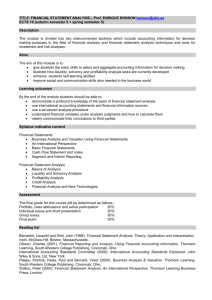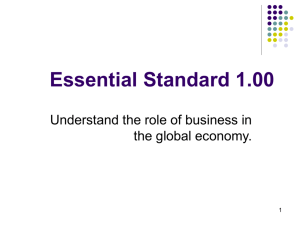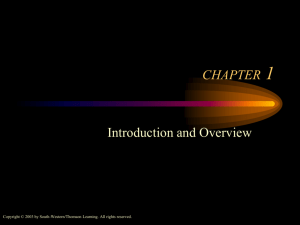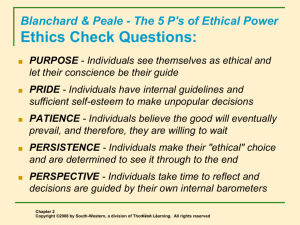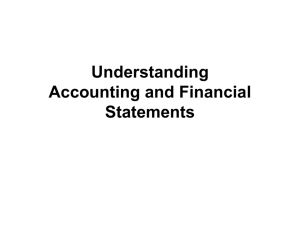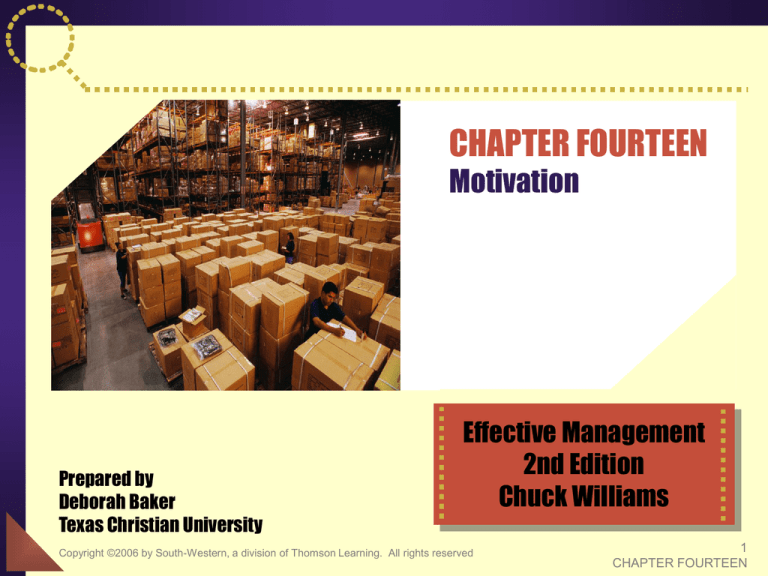
CHAPTER FOURTEEN
Motivation
Prepared by
Deborah Baker
Texas Christian University
Effective Management
2nd Edition
Chuck Williams
Copyright ©2006 by South-Western, a division of Thomson Learning. All rights reserved
1
CHAPTER FOURTEEN
Effort and Performance
Job Performance = Motivation x Ability x Situational Constraints
Job performance
how well someone performs the job
Motivation
effort put forth on the job
Ability
capability to do the job
Situational Constraints
external factors affecting performance
1.1
Copyright ©2006 by South-Western, a division of Thomson Learning. All rights reserved
2
CHAPTER FOURTEEN
Needs Classification
Maslow’s
Hierarchy
Alderfer’s
ERG
HigherOrder
Needs
SelfActualization
Esteem
Belongingness
Growth
Relatedness
LowerOrder
Needs
Safety
Physiological
Existence
McClelland’s
Learned Needs
Power
Achievement
Affiliation
Adapted From Exhibit 14.4
1.2
Copyright ©2006 by South-Western, a division of Thomson Learning. All rights reserved
3
CHAPTER FOURTEEN
Equity Theory
Inputs
employee contributions to the organization
Outcomes
rewards employees receive from the
organization
Referents
comparison others
Outcome/input (O/I) ratio
Outcomesself
= Outcomesother
Inputsself
Inputsother
2.1
Copyright ©2006 by South-Western, a division of Thomson Learning. All rights reserved
4
CHAPTER FOURTEEN
Motivating with Equity Theory
Look for and correct major inequities
Reduce employees’ inputs
Make sure decision-making processes
are fair
distributive justice
procedural justice
2.3
Copyright ©2006 by South-Western, a division of Thomson Learning. All rights reserved
5
CHAPTER FOURTEEN
Components of Expectancy Theory
Valence
Expectancy
Instrumentality
Motivation = Valence X Expectancy X Instrumentality
3
Copyright ©2006 by South-Western, a division of Thomson Learning. All rights reserved
6
CHAPTER FOURTEEN
Motivating with Expectancy Theory
3.2
Systematically gather information to find out
what employees want from their jobs
Clearly link rewards to individual performance
Empower employees to make decisions which
enhance expectancy perceptions
Copyright ©2006 by South-Western, a division of Thomson Learning. All rights reserved
7
CHAPTER FOURTEEN
Components of Reinforcement Theory
Positive reinforcement
desirable consequence strengthens behavior
Negative reinforcement
withholding unpleasant consequence strengthens
behavior
Punishment
unpleasant consequence weakens behavior
Extinction
no consequence weakens behavior
4.1
Copyright ©2006 by South-Western, a division of Thomson Learning. All rights reserved
8
CHAPTER FOURTEEN
Schedules for Delivering Reinforcement
Continuous
4.2
Copyright ©2006 by South-Western, a division of Thomson Learning. All rights reserved
Intermittent
9
CHAPTER FOURTEEN
Motivating with Reinforcement Theory
Identify, measure, analyze, intervene, and
evaluate
Don’t reinforce the wrong behavior
Correctly administer punishment at the
appropriate time
Choose the simplest and most effective
schedule of reinforcement
4.3
Copyright ©2006 by South-Western, a division of Thomson Learning. All rights reserved
10
CHAPTER FOURTEEN
Goal-Setting Theory
Goal Specificity
the clarity of goals
Goal Difficulty
how challenging goals are
Goal Acceptance
how well goals are agreed to or understood
Performance Feedback
information on goal progress
5.1
Copyright ©2006 by South-Western, a division of Thomson Learning. All rights reserved
11
CHAPTER FOURTEEN
Motivating with Goal-Setting Theory
Assign specific, challenging goals
Make sure workers truly accept organizational
goals
Provide frequent, specific performance-related
feedback
5.2
Copyright ©2006 by South-Western, a division of Thomson Learning. All rights reserved
12
CHAPTER FOURTEEN

